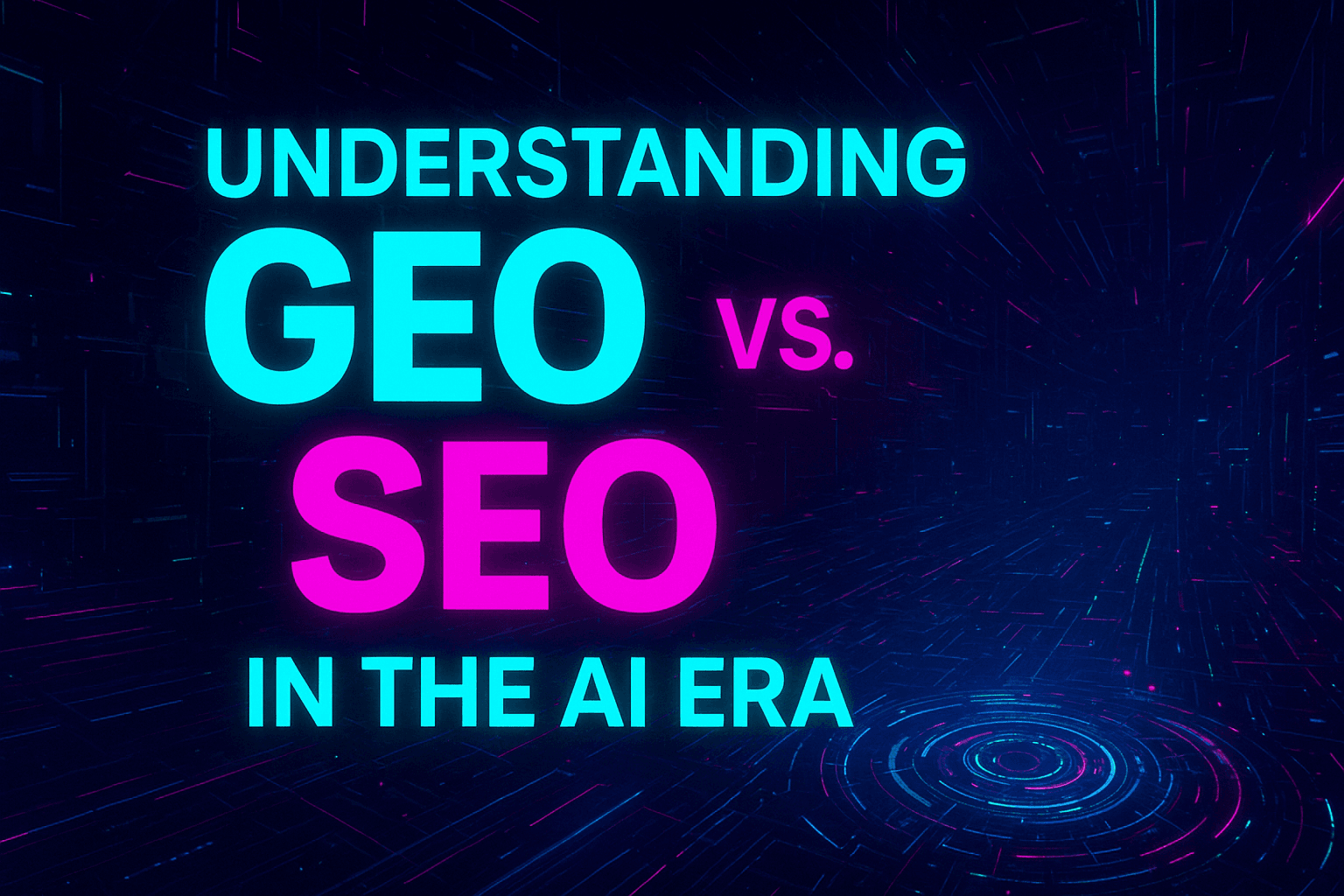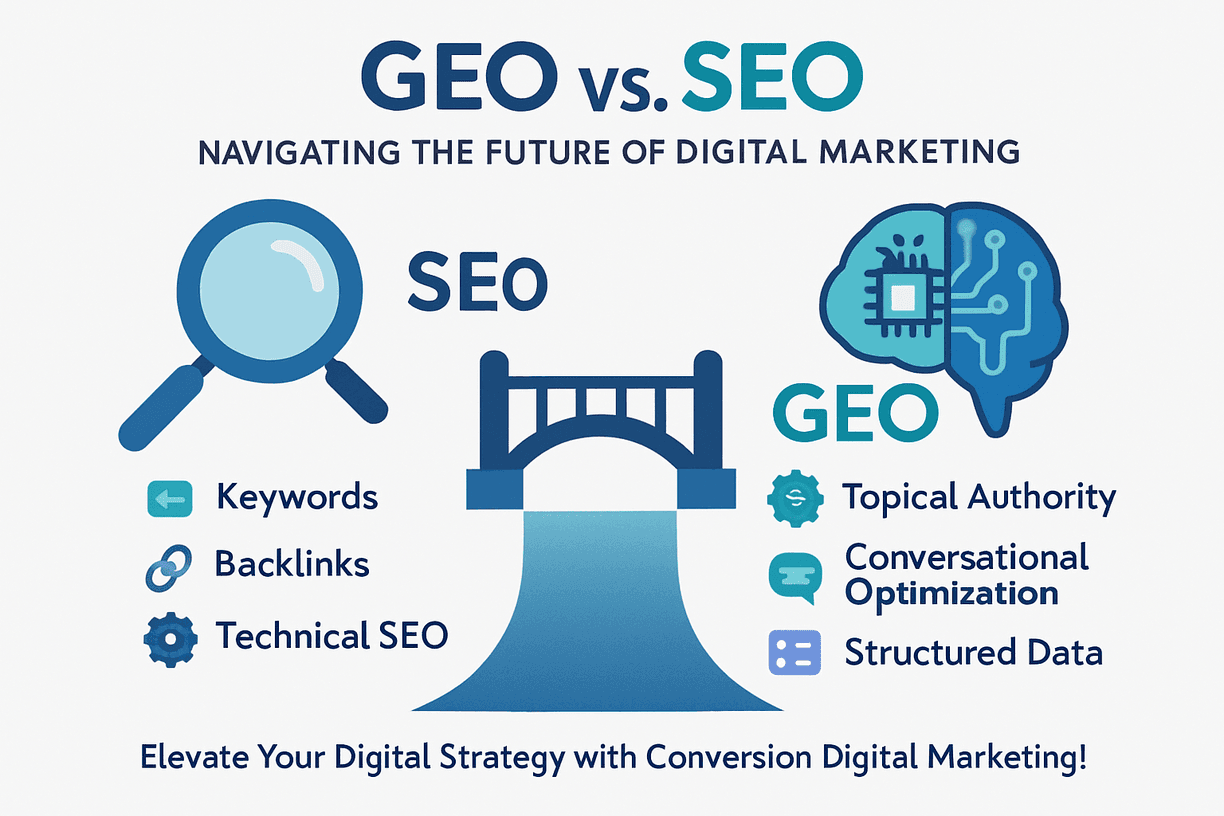Understanding GEO vs. SEO in the AI Era
Generative Engine Optimization vs. Search Engine Optimization
In the rapidly evolving world of digital marketing, staying ahead means not just understanding current trends, but also anticipating future shifts. For businesses and marketers alike, the terms SEO (Search Engine Optimization) and GEO (Generative Engine Optimization) are becoming increasingly central to strategic discussions, especially with the rise of AI integration and AI-driven search. While both aim to enhance online visibility and drive traffic, they operate on fundamentally different principles, reflecting the changing nature of how users interact with information online. This article will delve into the core distinctions between SEO and GEO, exploring their unique methodologies, applications, and what they mean for your digital marketing strategy in the age of conversational AI and generative AI.

What is Generative Engine Optimization (GEO)?
Generative Engine Optimization (GEO) is a newer, emerging concept in digital marketing that focuses on optimizing content for AI-driven search experiences and generative AI models. Unlike traditional SEO, which primarily aims to rank websites in a list of search results, GEO is about ensuring your content is discoverable, understood, and utilized by large language models (LLMs) and other generative AI systems that power conversational search, AI assistants, and content generation tools.
The rise of generative AI in search, exemplified by Google's Search Generative Experience (SGE) and similar initiatives, has shifted the paradigm. Users are increasingly receiving direct, synthesized answers to their queries, often without needing to click through to individual websites. GEO addresses this shift by focusing on:
Content Comprehensiveness and Authority: GEO emphasizes creating highly comprehensive, accurate, and authoritative content that can serve as a reliable source for AI models. This means going beyond simple keyword optimization to provide in-depth, nuanced information that fully addresses a user's query from multiple angles, establishing topical authority and digital reputation.
Conversational Optimization: Content needs to be structured and written in a way that is easily digestible and usable by conversational AI. This includes using natural language, answering common questions directly, and providing clear, concise explanations that an AI can readily extract and synthesize into a coherent response. This is crucial for voice search optimization and multimodal search.
Fact-Based and Verifiable Information: Given that generative AI models can sometimes 'hallucinate' or produce inaccurate information, GEO prioritizes content that is well-researched, fact-checked, and supported by credible sources. The goal is to become a trusted source that AI models will confidently cite or draw information from, enhancing AI content quality.
Contextual Relevance: Beyond keywords, GEO focuses on the overall context and semantic relevance of content. AI models are adept at understanding the intent behind queries and the relationships between concepts. Optimizing for GEO involves ensuring your content provides rich context and addresses related topics comprehensively, leading to better AI content generation.
Data and Structured Content: While not exclusive to GEO, the use of structured data (like Schema markup) becomes even more critical. This helps AI models understand the entities, relationships, and facts within your content, making it easier for them to process and integrate your information into their generative responses, improving AI content discoverability.
GEO represents a move from optimizing for algorithms that rank links to optimizing for algorithms that understand, synthesize, and generate information. The success of GEO is measured by how frequently and accurately your content is referenced or used in AI-generated responses, the visibility of your brand within these generative experiences, and ultimately, the ability to drive qualified traffic or engagement through these new pathways.
What is Search Engine Optimization (SEO)?
Search Engine Optimization (SEO) is a well-established discipline focused on improving a website's visibility in organic (unpaid) search engine results. The primary goal of SEO is to increase the quantity and quality of traffic to a website through search engines like Google, Bing, and Yahoo. This is achieved by optimizing various elements of a website to make it more appealing to search engine algorithms, which then rank the site higher in search results for relevant queries. In 2025, advanced SEO strategies emphasize user intent, semantic SEO, and E-E-A-T (Experience, Expertise, Authoritativeness, Trustworthiness).
SEO can be broadly categorized into several key areas:
On-Page SEO: This involves optimizing elements directly on your website. It includes comprehensive keyword research and integration, creating high-quality and relevant content, optimizing title tags and meta descriptions, improving URL structures, and ensuring proper use of header tags (H1, H2, etc.). The aim is to signal to search engines what your content is about and its relevance to specific search queries, aligning with long-tail keywords and conversational search queries.
Off-Page SEO: This refers to optimization efforts performed outside of your website to improve its ranking. The most significant aspect of off-page SEO is strategic link building, which involves acquiring high-quality backlinks from other reputable websites. These backlinks act as 'votes of confidence' for your site, signaling to search engines that your content is valuable and authoritative. Other off-page factors include social media marketing, brand mentions, and local SEO (for businesses with physical locations).
Technical SEO: This focuses on the technical aspects of a website to ensure it meets the technical requirements of modern search engines, thereby improving organic rankings. Key elements include website speed optimization, mobile-friendliness, site architecture (crawlability and indexability), use of structured data (schema markup), and security (HTTPS). A technically sound website allows search engine crawlers to efficiently access, crawl, and index content, which is crucial for search engine ranking factors.
Content Marketing: While often considered a separate discipline, content marketing is intrinsically linked with SEO. Creating valuable, relevant, and consistent content (blog posts, articles, videos, infographics, etc.) is crucial for attracting and engaging a target audience, which in turn improves search engine rankings. High-quality content naturally attracts backlinks and shares, further boosting SEO efforts. This includes focusing on topic clusters and content hubs to establish topical authority.
SEO relies heavily on understanding search engine algorithms, which constantly evolve. Marketers must adapt to these changes, focusing on user intent, providing valuable content, and building a strong online presence. The success of SEO is typically measured by organic traffic, keyword rankings, conversion rates, and backlink profiles. The integration of AI in SEO is also becoming a significant trend, assisting with content creation, keyword analysis, and technical audits.
Implications for Digital Marketing Strategy
The emergence of GEO does not diminish the importance of SEO; instead, it necessitates a more integrated and nuanced approach to digital marketing. Agencies and businesses must now consider how their content performs in both traditional search results and AI-driven generative experiences.

Here are key implications and strategic considerations for 2025 and beyond:
1.Holistic Content Strategy: Future-proof digital marketing requires a content strategy that serves both SEO and GEO. This means creating content that is not only keyword-optimized and technically sound for traditional search but also comprehensive, authoritative, and conversationally structured for AI models. Content should aim to answer user queries thoroughly, anticipating follow-up questions and providing rich context, focusing on topical authority and content hubs.
2.Prioritize Authority and Trust (E-E-A-T): With AI models increasingly relying on credible sources, building domain authority and trustworthiness becomes paramount. This involves rigorous fact-checking, citing reputable sources, and establishing your brand as an expert in its niche. For GEO, being a trusted source means your content is more likely to be selected and synthesized by AI, aligning with E-E-A-T principles.
3.Focus on User Intent, Not Just Keywords: While keywords remain important for SEO, understanding the deeper user intent behind queries is crucial for both. For GEO, content that truly addresses the user's underlying need and provides a complete answer will be favored by generative AI, as it seeks to provide comprehensive responses. This includes optimizing for long-tail keywords and conversational search.
4.Embrace Structured Data and Semantic SEO: Implementing structured data (Schema markup) is more critical than ever. It helps search engines and AI models understand the context and relationships within your content, making it easier for them to extract facts and integrate your information into their knowledge graphs and generative responses. This is a core component of semantic SEO.
5.Monitor AI-Driven Visibility and Performance: Marketers will need new metrics and tools to track their visibility within AI-generated responses. This could involve monitoring brand mentions in AI summaries, analyzing the types of queries where their content is synthesized, and understanding how AI-driven experiences impact direct website traffic. Conversion rate optimization (CRO) will also play a key role in maximizing the impact of AI-driven traffic.
6.Adapt to Evolving AI Capabilities: The field of generative AI is rapidly advancing. Digital marketers must stay informed about new AI models, search features, and user behaviors to continuously adapt their strategies. This agility will be key to maintaining relevance in an AI-first search landscape.
7.The Role of the Digital Marketing Agency: Agencies like Conversion Digital Marketing are uniquely positioned to guide businesses through this evolving landscape. We can help clients develop integrated strategies that leverage both SEO and GEO, ensuring maximum visibility and impact across all search modalities. This includes auditing existing content, developing AI-friendly content strategies, implementing technical optimizations, and monitoring performance in the new AI-driven search environment.
Conclusion: A Synergistic Approach for the Future
The digital marketing landscape is dynamic, and the advent of generative AI marks a significant evolution in how information is discovered and consumed. While SEO has long been the cornerstone of online visibility, GEO is rapidly emerging as its essential counterpart. It is not a matter of choosing between SEO and GEO, but rather understanding how they complement each other to form a robust, future-proof digital strategy.
For businesses looking to thrive in this new era, a synergistic approach is paramount. By optimizing for both traditional search engine algorithms and the sophisticated understanding of generative AI models, you can ensure your brand remains visible, authoritative, and relevant, regardless of how users choose to find information. Embracing both SEO and GEO will not only enhance your online presence but also position your brand as a leader in the intelligent, AI-driven future of digital marketing.

Ready to navigate the complexities of AI-driven search and elevate your digital presence?
At Conversion Digital Marketing, we specialize in crafting integrated strategies that blend cutting-edge SEO and GEO techniques to maximize your online visibility and drive measurable results. Partner with us to transform your digital marketing strategy and achieve sustainable growth in the evolving AI era.
Contact Conversion Digital Marketing today for a personalized consultation!
#DigitalMarketing #SEO #GEO #GenerativeAI #AIDrivenSearch #ContentMarketing #DigitalStrategy #ConversionDigitalMarketing #AIinMarketing #FutureOfSearch
